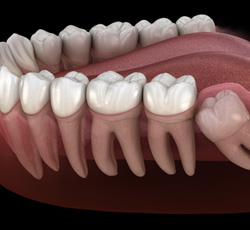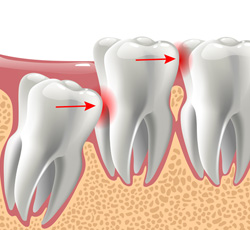
Wisdom Tooth Extraction Lovell
Say Goodbye to Problematic Wisdom Teeth

While wisdom teeth don’t always have to be removed, most of the time they cause more harm than good. They can be a source of pain if they become trapped under the gums, and they can potentially contribute to a number of oral health problems. If you or anyone in your family needs their wisdom teeth removed, Dr. Anderson will make sure that the procedure is performed safely and effectively. Call us today if you would like to learn more about wisdom tooth extraction and how it works at our office.
Why Choose Lovell Dental for Wisdom Tooth Extraction?
- Highly Experienced General Dentist
- State-of-the-Art Technology
- Nitrous Oxide Sedation for Nervous Patients
What are Wisdom Teeth?

The wisdom teeth are a third set of molars located near the back of the mouth. They typically erupt between the ages of 17 and 25 – long after all of the other teeth have already come in. While early humans may have benefitted from wisdom teeth, nowadays they are not necessary for the mouth to function. Most people have a total of four wisdom teeth, but certain individuals have fewer than that, and some don’t have any at all.
Why Do Wisdom Teeth Need to Be Removed?

It’s not always necessary to extract wisdom teeth if they aren’t causing any issues. However, an extraction may be warranted if:
- Your wisdom teeth are impacted, meaning they haven’t been able to emerge from beneath the gums.
- Your wisdom teeth are constantly causing pain.
- An infection has occurred around the wisdom teeth.
- A cyst has appeared near the wisdom teeth.
- The wisdom teeth are pushing on your other teeth, potentially moving them out of alignment.
If you schedule an appointment with our team, we can examine your mouth and determine whether a wisdom tooth extraction is truly necessary in your case.
What to Expect from the Wisdom Tooth Procedure

A fully or partially erupted wisdom tooth can often be removed with a simple extraction procedure. This involves lifting the tooth with a dental elevator before gently wiggling it out of its socket with forceps. On the other hand, an impacted wisdom tooth will likely require a surgical extraction. This involves making an incision in the gums so that the tooth can be accessed. Sometimes it may be necessary to divide the tooth into pieces that can be taken out of the mouth one at a time.
Recovering from Wisdom Tooth Extraction

To make sure your recovery goes as smoothly as possible after your wisdom tooth extraction, follow these simple steps:
- Do not drink through a straw, as doing so could dislodge the blood clot that has formed at the extraction site.
- Keep discomfort under control with over-the-counter pain medication.
- Stick to soft foods for the time being. Stay away from any foods that are hard or crunchy.
- Use extra pillows to keep your head raised when you go to sleep.